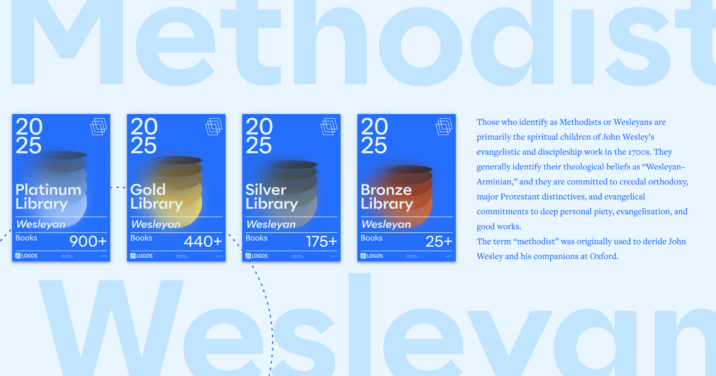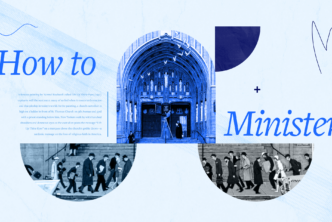This article explains the distinctive beliefs of the Methodist branches of Christianity, answers common questions, and shares the best resources for Methodist and Wesleyan Bible studies.
Table of contents
- Who are Methodists & Wesleyans?
- What does “Methodist” mean?
- What do Methodists & Wesleyans believe?
- FAQs about Methodist & Wesleyan Bible study
- What are some distinctive elements of Methodist & Wesleyan Bible study?
- What’s the Wesleyan Quadrilateral?
- What are the best resources to study the Bible as a Methodist–Wesleyan?
Who are Methodists & Wesleyans?
Those who identify as Methodists or Wesleyans are primarily the spiritual children of John Wesley’s evangelistic and discipleship work in the 1700s. They generally identify their theological beliefs as “Wesleyan–Arminian,” and they are committed to creedal orthodoxy, major Protestant distinctives, and evangelical commitments to deep personal piety, evangelization, and good works.1
What does “Methodist” mean?
The term “methodist” was originally used to deride John Wesley and his companions at Oxford. Because they were “determined to be Bible-Christians,” they were called methodists “in derision, [as well as] Bible-bigots … Bible-moths; feeding, they said, upon the Bible, as moths do upon cloth.”2 The label “methodist” stuck. Eventually Wesley owned the term.
What do Methodists & Wesleyans believe?
As with any branch of Christendom, diversity abounds.3 Broad strokes inevitably miss or blur some distinctions; formal statements of faith and the actual beliefs of people and churches may or may not correspond. Nonetheless, a number of common denominators exist.
What do Methodists believe about the Bible?
Wesley and other early Methodists “unanimously and unequivocally affirmed their belief in the divine inspiration and infallibility of the Scriptures.”4 John Wesley himself was adamant that Scripture is the inspired word of God and is “infallibly true.”5 Scripture contains no mistakes or falsehoods: “Nay, if there be any mistakes in the Bible there may as well be a thousand. If there be one falsehood in that book, it did not come from the God of truth.”6 In response to the assertion that God directed the writers of Scripture so that “no considerable error should fall from them,” Wesley demurs: “Nay, will not the allowing there is any error in Scripture, shake the authority of the whole?”7 Therefore, Wesley understands “the written Word is the whole and sole rule of … faith, as well as practice. [Methodists] believe whatsoever God has declared, and profess to do whatsoever he hath commanded.”8 Not all Methodists and Wesleyans today share Wesley’s view of Scripture.
What do Methodists & Wesleyans believe about salvation?
The distinctives of Methodist–Wesleyan belief have been epitomized in four short statements:
- All men need to be saved.
- All men can be saved.
- All men can know they are saved.
- All men can be saved to the uttermost.9
These statements reflect Methodist–Wesleyan’s commitment to the doctrines of original sin and total depravity, God’s provision of atonement sufficient and available to all men through faith in Christ alone, the witness of the Holy Spirit to the child of God that he/she has been born again, and the possibility of being entirely sanctified in this present life and of living a life of inward and outward holiness.
Is there a difference between Methodists & Wesleyans?
The terms Wesleyan and Methodist are sometimes used interchangeably, but they can be helpfully distinguished in three ways:
1. Historically
In the historical sense, the term “Methodist” was used first for those who followed John and Charles Wesley, George Whitfield, and other members of the Oxford Holy Club. According to the Oxford English Dictionary (OED), the earliest evidence for the term “Wesleyan” is from 1772 in the writings of John William Fletcher.10
2. Ecclesially
Here, “Methodist” is the broader term encompassing the American Methodist Episcopal Church, Free Methodist Church, United Methodist Church, Global Methodist Church, and most other churches around the world that have the word Methodist in their name. Wesleyan is generally a descriptor of a person belonging to the Wesleyan Church, a denomination birthed in 1968 from the merger of the Wesleyan Methodist Church (founded 1843) and the Pilgrim Holiness Church (founded 1897).
3. Theologically
The term “Wesleyan” is the broader and more common way to refer to the theological distinctives that have marked the followers of John and Charles Wesley.
FAQs about Methodist & Wesleyan Bible study
Many people ask questions about Methodist and Wesleyan Bible study online. Here are three of the most commonly asked questions and their answers.
1. Do Methodists & Wesleyans study the Bible?
Like John Wesley, Methodists and Wesleyans care deeply about the study of Scripture. Wesley urged regular engagement with Scripture. In his preface to his Explanatory Notes on the Old Testament, Wesley wrote (here I summarize and abridge):
- Set apart a little time morning and evening for that purpose.
- Read a chapter out of the Old and one out of the New Testament: if you cannot do this, take a single chapter, or a part of one.
- Read to know the whole will of God and with a fixed resolution to do it.
- Be alert to the harmony there is between those grand, fundamental doctrines, original sin, justification by faith, the new birth, inward and outward holiness.
- Before reading, pray for the Spirit’s enabling to understand. Close with prayer, that what was read will be written on your heart.
- While reading, pause and examine yourself by what you read. Where God has enabled you to conform to his blessed will, praise him. Where you have fallen short, humble yourself and repent.
- Immediately apply whatever light you receive. Let there be no delay. So shall you find Scripture to be the power of God unto present and eternal salvation.11
2. Are there Methodist & Wesleyan scholars?
From its inception, Wesleyan Methodism has encouraged lay and scholarly study of Scripture. Wesley was scholarly himself, but his consistent concern was for the layman, including the illiterate. He appointed Methodist class leaders based on spiritual maturity, not educational status. He promoted literacy among his unlettered preachers by urging them to read their Bibles, his sermons, and as widely as opportunity afforded. Among the more well-known scholars in Methodist history are John Fletcher, Adam Clarke, Richard Watson, William Burt Pope, and James Strong (Strong’s Concordance).
3. Who are some well-known Methodist & Wesleyan scholars?
A short list would include:
- Fred Sanders
- Richard B. Hays
- Ben Witherington III
- David deSilva
- I. Howard Marshall
- Thomas H. McCall
- Thomas C. Oden
- Craig Keener
- Joel B. Green
- John Oswalt
- Bill T. Arnold
- Victor P. Hamilton
- Robert C. Coleman
- James D. G. Dunn
- Kenneth J. Collins
- James Charlesworth
There are many, many more names that could be added.12
What are some distinctive elements of Methodist & Wesleyan Bible study?
Methodist and Wesleyan Bible study has a distinctive accent, even if the language is that of historic Christian orthodoxy. In particular, the following features are commonly noted:
1. An optimism of grace
God’s grace is available to enable every believer to live out Scripture’s call to holiness of heart and life.
2. Dependence on the Spirit
The Spirit guides believers to understand Scripture.13
3. Commitment to generous orthodoxy
“As to all opinions which do not strike at the root of Christianity, we think and let think.”14
4. Focus on transformation
God’s purpose for Scripture is to redeem and transform believers into his likeness.15
5. Experiential confirmation
Mature Christian experience should confirm proper interpretation.16
What’s the Wesleyan Quadrilateral?
Methodists and Wesleyans sometimes speak of studying Scripture through a “Wesleyan quadrilateral”:
- Scripture
- Tradition
- Reason
- Experience17
The term itself is of twentieth-century origin. It remains disputed, as well as subject to multiple conflicting interpretations.18
Without doubt, Methodists and Wesleyans take reason, experience, and the church’s historical understanding of Scripture into account in their Bible study,19 as do most Christian traditions. Generally, Methodists and Wesleyans see reason, experience, and Christian tradition as valuable aids in the understanding and application of Scripture.
What are the best resources to study the Bible as a Methodist–Wesleyan?
Logos provides an impressive collection of resources for Methodist and Wesleyan Bible study. Get the tools you need to help you hear the Spirit’s voice and live a Spirit-empowered, holy life.
The best Methodist & Wesleyan study Bible
Many Methodists and Wesleyans find guidance for understanding the Bible and living a holy life in Wesley’s classic Explanatory Notes upon the Old and New Testaments (5 vols.). Others are inspired to “love God with a warmed heart; serve God with active hands” by the recently published Wesley Study Bible.
The best deal on Logos Methodist & Wesleyan libraries
Items on Logos can be purchased individually at great prices, but with a subscription to Logos, you can also save with the value of a Logos library. With Logos Methodist & Wesleyan Bronze, for instance, you’ll get the Wesleyan Bible Commentary, Wesley’s Explanatory Notes upon the New Testament, some three Wesleyan–Arminian systematic theologies, plus scores of other books.
Compare Methodist & Wesleyan libraries.
In addition to the Methodist libraries, the Methodist & Wesleyan Library Builder contains the Works of Arminius series, Adam Clark, Charles Wesley, and John Fletcher, the Wesleyan Ministry Leadership collection, and much more.
Buying a library on Logos, as opposed to purchasing books separately, enables me to steward God’s money well (Luke 16:9–11). Doing so strikes the balance between getting the best resources to equip me for ministry and maximizing my personal savings.
God uses means (of grace)
“The Holy triune God [gives] Holy Scripture as a means of grace whereby the Holy Spirit transforms sinners into truly holy persons by uniting them to the incarnate Son.”20 God uses means to transform us, chief among them is his Word. Our task is the labor of interpreting it accurately (2 Tim 2:14–17) and applying it diligently (Jas 1:25) in dependence on the Holy Spirit (1 Cor 2:12–14), using the best tools possible.
The right Logos library and features tailored to your ministry can make Bible study easier, smoother, and more productive.
Related resources for studying Methodism
Start studying with a Logos Wesleyan library today
- Although the converts of George Whitefield formed Methodist congregations that were Calvinistic in their soteriology, few Calvinistic Methodist denominations exist today. Among them are the Welsh Calvinistic Methodist Church, now known as the Presbyterian Church of Wales, and the Reformation Bible Church, formerly the Evangelical Methodist Church, founded in 1957.
- John Wesley, “On God’s Vineyard” in The Works of John Wesley, 3rd ed. (London: Wesleyan Methodist Book Room, 1872), 7:203.
- For exposure to the diversity in Methodist and Wesleyan beliefs about the Bible, see Barry L. Callen and Richard P. Thompson, Reading the Bible in Wesleyan Ways: Some Constructive Proposals (Kansas City, MI: Beacon Hill Press, 2004), and Joel B. Green and David F. Watson, eds., Wesley, Wesleyans, and Reading Bible as Scripture (Waco, TX: Baylor University Press, 2012).
- Daryl McCarthy, “Early Wesleyan Views of Scripture.” Wesleyan Theological Journal 16.2 (1981): 103. For the continuity of Methodists’ view of Scripture’s infallible authority well into the nineteenth century, see Thomas H. McCall, “Wesleyan Theology and the Authority of Scripture: Historic Affirmations and Some Contemporary Issues,” in The Enduring Authority of the Christian Scriptures, ed. D. A. Carson (Grand Rapids, MI: Eerdmans, 2016), 171–94.
- Wesley, “Sermon XVI: The Means of Grace,” Works, 5:193.
- Wesley, “An Extract of a Letter to the Reverend Mr. Law: Occasioned by Some of His Late Writings,” Works, 9:481.
- Wesley, “A Letter to the Right Reverend, The Lord Bishop of Gloucester: Occasioned by His Tract ‘On the Office and Operations of the Holy Spirit,’” Works, 9:150
- Wesley, “Sermon CVI: On Faith,” Works, 7:198.
- W. B. Fitzgerald, The Roots of Methodism (London: Epworth Press, 1903), 173. For an expanded introduction to these distinctives, see Kenneth J. Collins, “Introduction to a Wesleyan Theological Orientation,” in Wesley One Volume Commentary, ed. Kenneth J. Collins and Robert W. Wall (Nashville, TN: Abingdon Press, 2020), xiii–xx.
- John William Fletcher, The Works of the Reverend John Fletcher (New York: Carlton & Porter, 1833), 1:145, 444, 516.
- Adapted from John Wesley, “Preface,” in Explanatory Notes upon the Old Testament (Bristol: William Pine, 1765), 1:ix.
- See, for example, the list of scholars in the recent “The Faith Once Delivered: A Wesleyan Witness.”
- In his letter to someone who had recently joined the Quakers, Wesley writes, “Though the Spirit is our principal leader, yet He is not our rule at all; the Scriptures are the rule whereby he leads us into all truth. Therefore … call the Spirit our guide, which signifies an intelligent being, and the Scriptures our rule, which signifies something used by an intelligent being.” Wesley, Works, 10:178.
- In “The Character of a Methodist,” Wesley plainly states, “But as to all opinions which do not strike at the root of Christianity, we think and let think. So that whatsoever they are, whether right or wrong, they are no distinguishing marks of a Methodist. … all who follow my judgment, do vehemently refuse to be distinguished from other men, by any but the common principles of Christianity—the plain, old Christianity that I teach, renouncing and detesting all other marks of distinction.” Wesley, Works, 8:340, 346.
- “As Wesleyans, we read with a constant eye to what Wesley called ‘the Scripture way of salvation.’ We read with a constant eye toward the ongoing formation of the people of God in holiness.” Joel B. Green, Reading Scripture as Wesleyans (Nashville, TN: Abingdon Press, 2010), ix.
- In his sermon “The Means of Grace,” he describes his method of Bible study as praying for illumination, considering parallel passages, and then, “If any doubt still remains, I consult those who are experienced in the things of God; and then the writings whereby, being dead, they yet speak.” Wesley, Works, 5:3–4.
- Donald A. D. Thorsen, The Wesleyan Quadrilateral: Scripture, Tradition, Reason & Experience as a Model of Evangelical Theology (Grand Rapids, MI: Zondervan, 1990). For a valuable analysis of how Wesley used Scripture, tradition, reason, and experience, see Scott J. Jones, John Wesley’s Conception and Use of Scripture (Nashville, TN: Abingdon Press, 1995), 160–84.
- See William J. Abraham’s trenchant critique in Waking from Doctrinal Amnesia: The Healing of Doctrine in the United Methodist Church (Nashville, TN: Abingdon Press, 1995). Recent discussions include Daniel J. Pratt Morris-Chapman, “Is the ‘Wesleyan Quadrilateral’ an Accurate Portrayal of Wesley’s Theological Method?,” Journal of Theology and Ministry 5.2 (2018): 1–17; and David F. Watson, “The Global Methodist Church and the Quadrilateral,” Firebrand Magazine, March 21, 2023.
- See, for example, Ben Witherington III, Reading and Understanding the Bible (Oxford: Oxford University Press, 2015), 104–05.
- McCall, “Wesleyan Theology and the Authority of Scripture,” 194.






